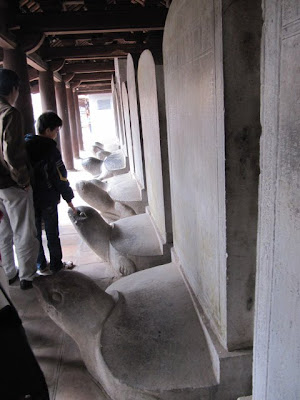



Ho Chi Minh

Our travel agent and tour guide in Hanoi, Tho, with us in front of Ho Chi Minh memorial.

Changing of the guard.
December 31, 2010
I started our day in Hanoi with an early morning run through the lake park in the center of town, just a couple blocks from our hotel. Again, I was hesitant about heading out just after sunrise, so early in a big city. Then, I got to the park and it was packed! Just like in Phnom Penh, but even more vibrant and communal. It made me laugh out loud in joy.
On the sidewalk surrounding the lake there were large groups of people next to music blared through big speakers. There was the typical tai chi and aerobics. But, what was remarkable was the novelty for me of seeing people moving in unison with swords or red fans to traditional Asian music. Some were dancing in woman-woman couples to latin music, wiggling their hips appropriately. There were old and semi-young out there, with everyone seeming like they've known each other for years, having met there every morning at 6am forever and ever.
They can be friendly with their friends, but they sure aren't generally friendly people. Cambodia and Laos people seemed much more warm and friendly, generally. There's a hard-nosed, industriousness that seems to fit with China. Turns out Vietnam means "Southern China," which makes sense. Vietnamese government even changes its policies to fit China's pretty soon after China changes its policies. The government seems to have both tight control over it's country and people while it also allows booming capitalistic entrepreneurship. Socialism is alive and well here, with lots of room for hard work and initiative to make money.
You might wonder how things have changed towards Americans since the Vietnam War. They've changed radically. First, the government started allowing Vietnam Vets back in the country to travel. And, they let back in Vietnamese people who'd moved to the US after the Vietnam War. They'd previously not been let into the country, even as a tourist. After the Americans saw how it was safe for Vietnam Vets and more travel in Vietnam, more Americans came as tourists.
Now, this country is packed with American tourists, along with others. There's no evident hostility towards the Americans or French, although the Vietnam history was told to us with a lot of resentment towards how the French government treated Vietnam when they colonized the Vietnamese. For example, the Vietnamese blame the French for a famine that killed 2 million Vietnamese.
The Vietnamese are not as spiritual people as the Buddhist Cambodians and Laotians, even though the Vietnamese are 70% Buddhist. But, they sure do revere their military leaders, to the point that they pray to them. For real. There's a lovely temple on a lake island in Hanoi where we thought Buddha was being prayed to but it was actually a general they prayed to -- a general who helped free them from the French. In fact, it seems that their adoration and belief in their military leadership has replaced any formal religion here.
But, the biggest military leader they adore and pray to is Ho Chi Minh. He freed the Vietnamese from what they saw as French oppression. There are grand stories told to us about how he cleverly fought a guerrilla war against the French. Above, you can see the Ho Chi Minh memorial, which was the first place our guide took us. There is a changing of the guard there too. Click
here to see the video. It's a much simpler, less fancy changing of the guard than we saw in Greece and England, in keeping with the more simple, clean design of most of the government grounds and buildings.




 December 31, 2010
December 31, 2010












